Key takeaways
- Descartes’ method of radical doubt challenges readers to question their beliefs and the foundation of knowledge, fostering personal reflection.
- The phrase “Cogito, ergo sum” highlights the undeniable proof of existence through the act of thinking, anchoring one’s identity amid uncertainty.
- Teaching Descartes emphasizes critical thinking skills and the importance of engaging with philosophy on a personal level, making complex ideas more accessible.
- Applying Descartes’ principles encourages active inquiry and self-awareness in learning, transforming doubt into a tool for deeper understanding.
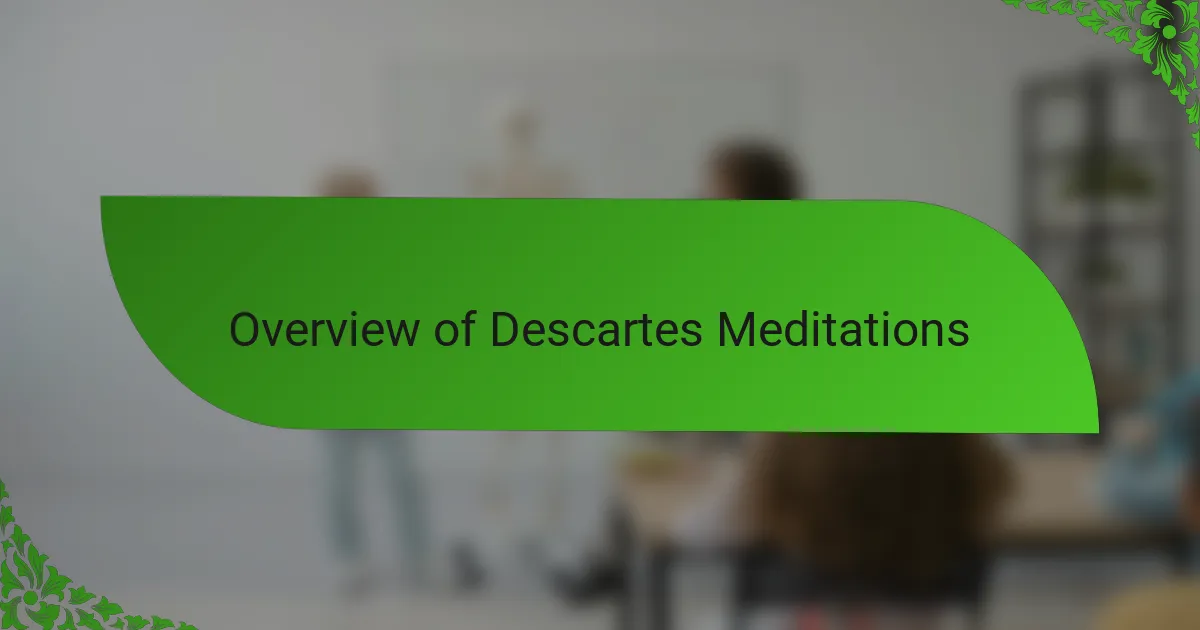
Overview of Descartes Meditations
Descartes’ Meditations is a profound journey into the nature of knowledge and existence. In my experience, reading it felt like peeling back layers of certainty, questioning everything I had taken for granted. How often do we pause to doubt the very foundation of our beliefs?
What strikes me most is Descartes’ methodical approach—starting with radical doubt and moving towards the certainty of the self as a thinking entity. It’s fascinating how he uses skeptical inquiry not to destroy knowledge but to rebuild it on firmer ground. I remember feeling both challenged and inspired by his clarity and rigor.
The Meditations invites us to explore deep philosophical questions personally rather than just accepting abstract ideas. It’s almost like having a conversation with Descartes himself, guiding us to discover truths through reflection. Don’t you find that engaging with such texts changes how you see your own mind and reality?
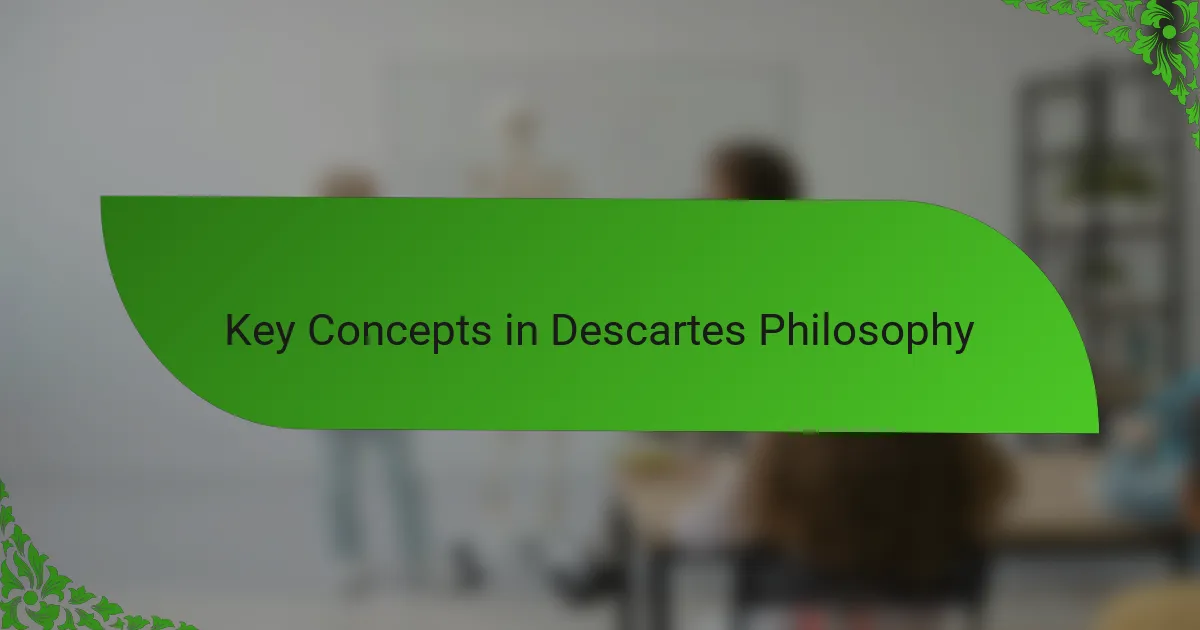
Key Concepts in Descartes Philosophy
Descartes’ philosophy centers on a few key concepts that really reshaped how I think about knowledge and existence. The idea of methodic doubt—where he questions everything that can possibly be doubted—felt like a mental reset for me, forcing a fresh look at what I could truly trust. Have you ever tried doubting your own senses so deeply that reality itself seemed to waver?
Another concept that stuck with me is the famous Cogito, ergo sum—“I think, therefore I am.” It’s simple yet profound. To realize that the act of thinking is undeniable proof of one’s existence gave me a strange sense of grounding amid uncertainty. It’s like anchoring yourself in a storm of doubts by recognizing your own conscious experience as an indubitable truth.
Lastly, Descartes’ distinction between the mind and the body opened up a fascinating dialogue within me about the nature of self. The mind as a thinking, immaterial substance contrasts with the physical body, and this dualism challenges how we perceive our identity. Have you ever considered how these two interact and what that means for who we really are? I found this question both perplexing and invigorating to ponder.
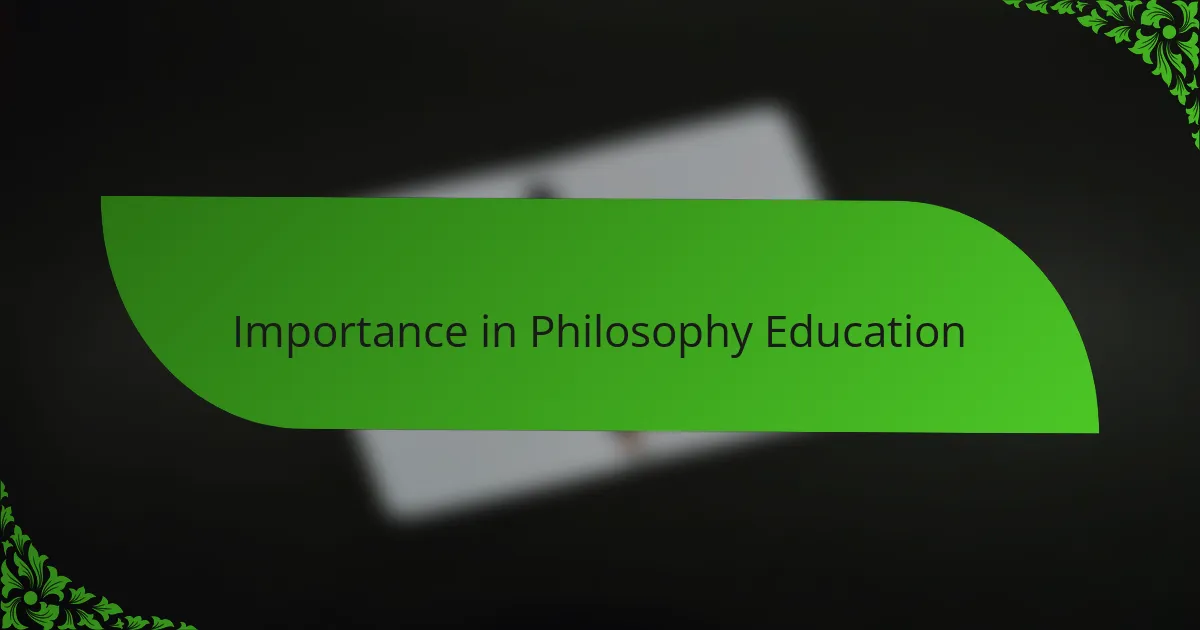
Importance in Philosophy Education
Philosophy education gains real depth when texts like Descartes’ Meditations become part of the journey. From my experience, working through his skepticism encourages students to wrestle with doubt rather than avoid it—an essential skill for any critical thinker. Don’t you think learning to question so thoroughly prepares us better for any intellectual challenge?
I’ve noticed that Descartes’ clear, step-by-step reasoning sets a valuable example for how to approach complex ideas methodically. It’s not just about what he concludes, but how he arrives there that matters in teaching philosophy. When I first followed his argument closely, I felt a growing confidence in my ability to analyze and construct philosophical arguments on my own.
Ultimately, the Meditations opens a door to self-reflection that’s hard to replicate with other texts. It invites students to engage not just intellectually but personally with philosophy, making the subject come alive. Have you ever had a moment where a piece of philosophy didn’t just inform you but transformed how you see yourself? That’s the power Descartes brings to philosophy education.
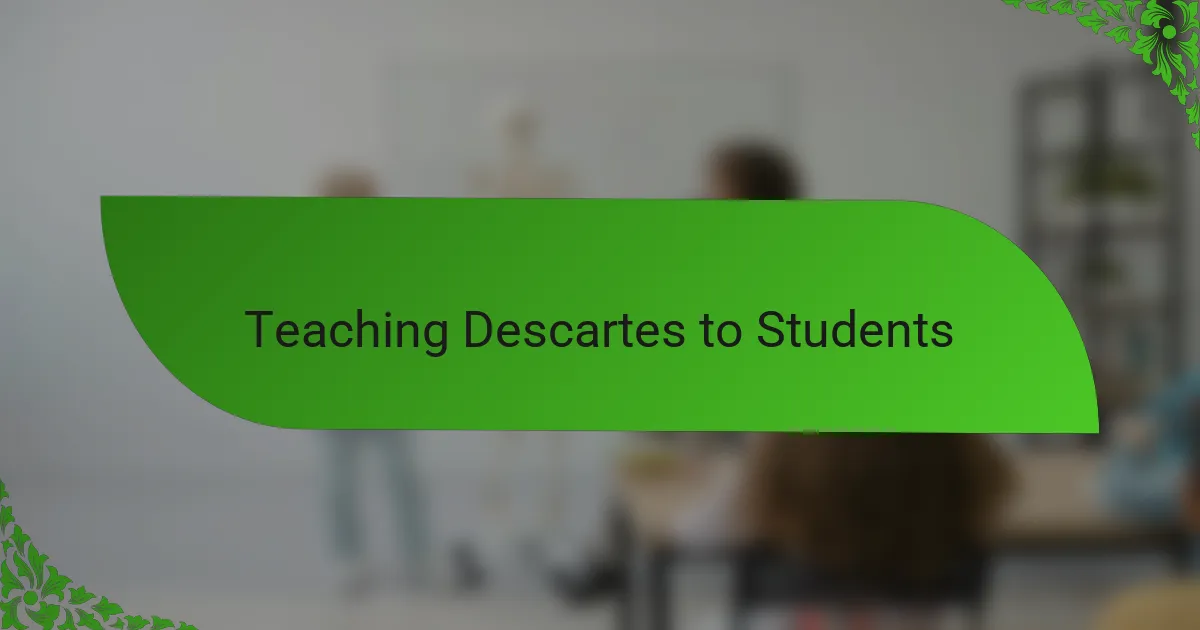
Teaching Descartes to Students
Teaching Descartes to students often feels like guiding them through a delicate balance of confusion and clarity. I recall how some initially resist the deep skepticism, almost as if it threatens their sense of reality—and that resistance, interestingly, can be the catalyst for real philosophical growth. Have you noticed how challenging their assumptions opens up new spaces for critical thinking?
One approach I’ve found effective is focusing on Descartes’ methodical progression rather than just the conclusions. Breaking down each meditation into manageable steps helps students see philosophy as a process, not an obscure puzzle. When students grasp this, their confidence in tackling difficult ideas often skyrockets.
I also like to encourage students to relate the Meditations to their own experiences of doubt and certainty. When they realize Descartes isn’t just debating abstract ideas but inviting them to examine their own beliefs, the text becomes more accessible and meaningful. Isn’t it rewarding to witness that moment a student connects personally with philosophy?
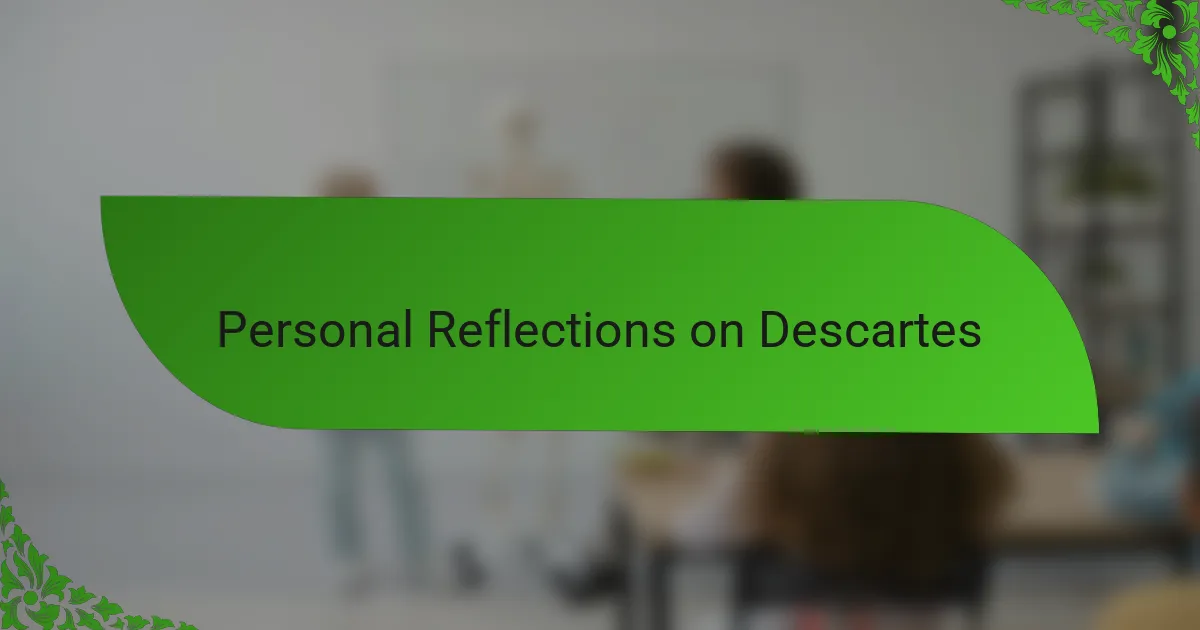
Personal Reflections on Descartes
Reflecting on Descartes’ Meditations, I often find myself returning to that initial moment of doubt he so rigorously embraces. It’s unsettling yet oddly liberating to admit how much of what I assumed was certain can be questioned. Have you ever felt that same mixture of discomfort and curiosity when unpacking your own beliefs?
What truly resonated with me was how Descartes doesn’t leave us stranded in skepticism but leads us toward a foundational certainty—the self as a thinking being. That journey felt deeply personal, as if I was not just reading philosophy but rediscovering my own sense of existence. It made me wonder: how often do we pause to affirm our own consciousness amid life’s chaos?
Finally, grappling with Descartes’ mind-body dualism stirred a quiet but persistent reflection inside me. It challenged my everyday understanding of who I am and prompted me to ask—am I just my thoughts, or is there something more intertwined with the physical? These questions linger, shaping how I experience myself and the world around me in profound ways.
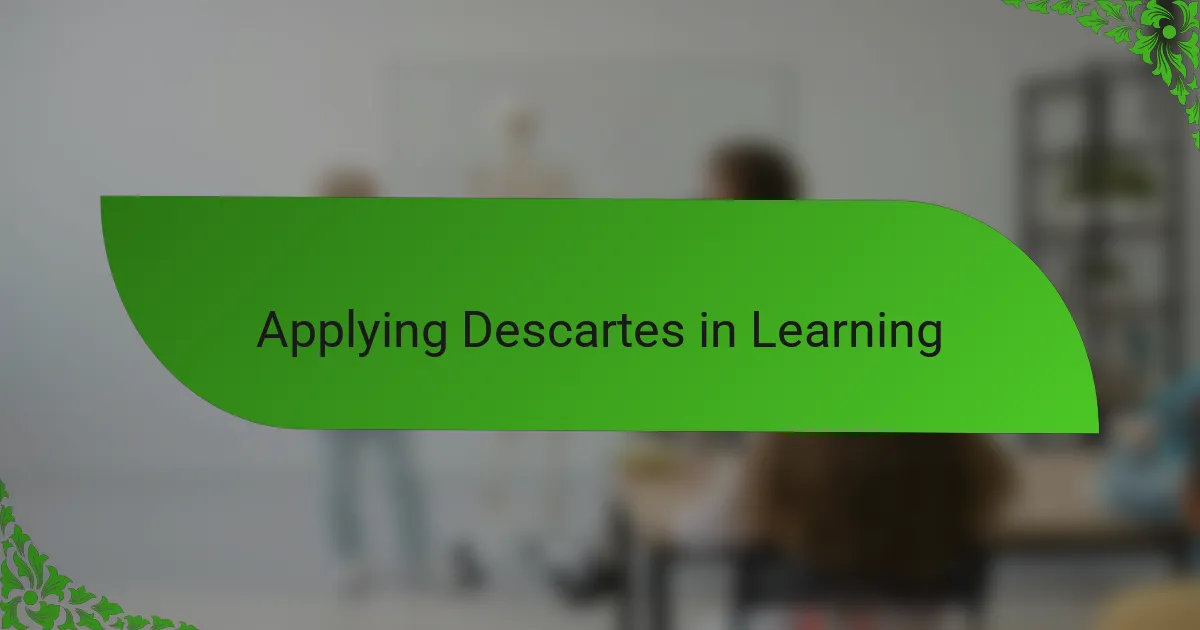
Applying Descartes in Learning
Applying Descartes’ method of radical doubt in learning can transform how we approach knowledge. I’ve noticed that when I pause to question even the most basic assumptions, my understanding deepens beyond surface facts. Doesn’t it feel empowering to realize that doubt isn’t a barrier but a tool for clearer insight?
When I apply Descartes’ insistence on clarity and distinctness to my studies, I find it helps me organize ideas more rigorously. It’s like building a sturdy foundation step-by-step rather than rushing to conclusions. Have you tried breaking down complex topics this way? It changes the whole learning experience.
What I find most striking is how Descartes invites us to trust our reasoning as the starting point for knowledge. This encourages an active, self-aware learner rather than a passive receiver of information. I wonder—how might your own learning transform if you embraced this mindset? For me, it made studying feel like an adventure in discovery rather than a chore.
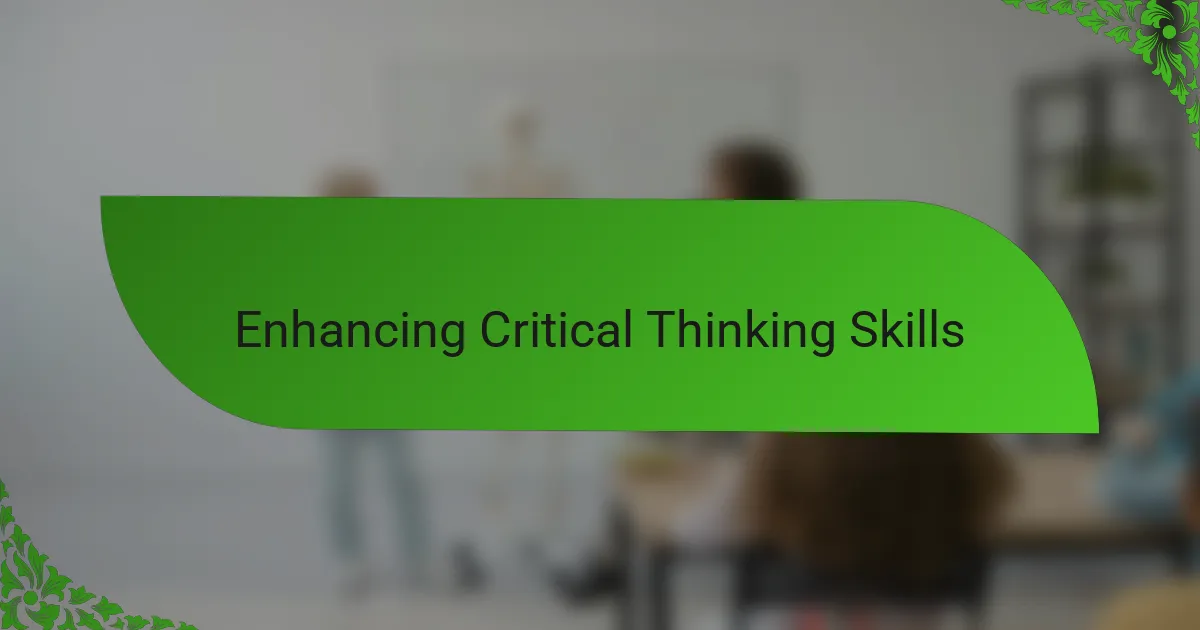
Enhancing Critical Thinking Skills
Enhancing critical thinking skills through Descartes’ Meditations felt like training my mind to be both skeptical and curious at once. I realized that doubt isn’t just about disbelief—it’s a powerful starting point for deeper understanding. Have you ever caught yourself questioning something so thoroughly that you uncover insights you hadn’t noticed before?
What truly helped me sharpen my critical thinking was following Descartes’ step-by-step approach to dismantling and reconstructing beliefs. It’s like carefully taking apart a machine to understand how it works and then putting it back together with greater clarity. This method gave me confidence to tackle complex problems without feeling overwhelmed.
Moreover, engaging with Descartes pushed me to become more aware of my own thought processes. By reflecting on why I believe what I do, I developed a habit of examining assumptions rather than accepting ideas at face value. Don’t you think that kind of mental discipline is invaluable, not just in philosophy but in everyday decisions?